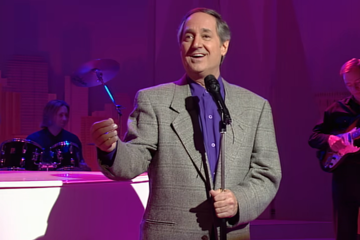 Angie McMahon
Angie McMahon"Full disclosure: interviews make me nervous," admits Angie McMahon. The 24-year-old singer-songwriter from Melbourne is still getting used to them, still finding her feet fresh off the release of her beloved, Hottest 100-cracking debut single, Slow Mover.
"I'm nervous doing interviews because I feel like my career is starting," McMahon explains. "I've put out a song and people like it, so they're asking me questions, trying to understand who I am as an artist. But, I don't even really understand myself as an artist. I feel really young, like a total baby. I feel lucky that people want to ask me questions, but I'm nervous I'm not going to make sense, or say something stupid. We can all be really hard on ourselves when we're trying to define ourselves, so I'm trying not to do that and just accept that I'm new at this - that I'm learning on the job. It's a weird job, but a cool one."
McMahon grew up in Alphington, in Melbourne's North East, playing music all the while: learning piano, teaching herself guitar, singing in choirs, playing trumpet in school bands. Her early love was for "big, powerhouse female vocalists", McMahon remembers. "When I was a teenager, it was definitely Adele and Missy Higgins - those were my two big idols. Aretha Franklin. And KD Lang - my family had a CD of her doing covers of famous Canadian singer-songwriters like Leonard Cohen, Joni Mitchell, Neil Young, in her beautiful voice. That's how I wanted to make people feel: that warm kind of sadness."

Pic by Ben McNamara
She wrote her first song at 14 - "I wrote it about being in a cage," she laughs. "I guess I was getting in touch with my angst, in a therapeutic way, writing it out of myself" - and, from there, she'd "write a new song every few months", each one a "little bit better than the last". Once she first heard Adele, her songs "were really just plagiarised versions of Adele songs", but writing them was formative. "I realised I could do what other artists were doing, like, 'Hey, I can write a piano ballad that expresses all this emotion and bring dynamics into my voice,'" she recounts. "I was learning how to be able to do really emotional shit and, even though the songs weren't great, I was really proud of myself."
Don't miss a beat with our FREE daily newsletter
McMahon received plenty of positive feedback in these formative years, mostly because people liked her singing voice. "If you have a nice vocal tone, people think your songs are good even when they're not," she laughs. "So they were always supportive. That makes so much difference when you're young, when you're so fragile. Little things that people say, whether they're supportive or they're hurtful, can definitely be defining on whether you pursue music."
And pursue music McMahon did. While studying arts at Melbourne Uni, she played both solo shows and was also in nine-piece soul band The Fabric. "I was the lead singer, then there were eight boys," she offers, of the latter. "It was this great opportunity to dance, sing really loudly, project a lot. It was so fun. I got addicted to that feeling of being on stage."
Where shows with The Fabric were riots of adrenaline, solo gigs were "an opportunity to be really introverted, hide behind the guitar a lot, command a really quiet room, create a space where the lyrics are really important, and where people really concentrate on them", McMahon offers.
"I prefer to focus on lyrics. I listen really deeply to lyrics and feel really connected to them. I'm a lyric person. My favourite artists over years and years have been singer-songwriters, people who put so much care into the words they write and the way they phrase them. Bruce Springsteen is an amazing storyteller. Bob Dylan's songs that are totally not about him, but stories about people living through hardships. Leonard Cohen and Joni Mitchell, [who write] such precise poetry... It's important, what you write about. If you're going to be an artist, you have to think carefully about what you're actually saying."
The lyrics - and the songs - McMahon writes are a "personal type of therapy", she says; a way of "trying to find an answer to what feels like an emotional problem, like, 'I'm feeling this thing, why am I feeling this thing, does everyone else feel this thing, how am I going to resolve this thing?' I'm writing really honest and open songs. If you're going to view writing songs as a form of therapy, then it's on you to be as honest as possible. I'm not creating a character, it's real heart-on-sleeve kind of stuff."
McMahon is not only already witnessing how listeners react to that candidness, but also how they can also draw too direct a connection between the words in a song and the person who wrote it. "It's an interesting thing, now my musical identity is starting to be different to my personal identity, even though they're both under my name," she offers. She recently felt that divide when watching an Instagram video of her performing, where the sounds of dudes in the crowd talking critically about her choice of amplifier were audible. "It was this 15-second snippet where I could see myself sing whilst situated within the crowd. I could really enter the audience's eyes, see myself outside myself," she says.

PIC BY BEN MCNAMARA
When Slow Mover took off upon its release, McMahon realised she "wasn't quite ready for the attention" that came with it. "I'm so glad and grateful that people like the song. But I'm not that good at guitar yet, and I need to have more songs that are eloquent and intelligent, and I need to have a better handle on myself," she admits. "When I put that song out, I got really nervous, it all felt overwhelming... Like, you have this dream, and then it starts happening and it doesn't feel anything like you expected. That can make you put a lot of pressure on yourself, even feel anxious and depressed."
McMahon has, since, funnelled her energy into working on her debut LP. "I'm thinking about the album all the time, thinking about music all the time - about myself and my music," she says. Working with bassist/producer Alex O'Gorman (formerly of Big Smoke), the goal is to "capture the songs in their best form", without frills. The approach is largely inspired by US outfit Big Thief, the way Adrianne Lenker's songs - filled with amazing lyrics of their own - are captured simply, the results feeling "really human, musical in the purest way", without any grander concept.
"That's what I want to do," McMahon states. "Sometimes I read interviews with musicians who have these really great conceptual ideas and I think, 'Is that what I should be doing?' I don't do that! I would love to have a concept, but I just don't; that's not how I think about music. To me, music feels like a higher power. It's something that can feel like it flows through you; sometimes, especially with older songs, I can't always really remember writing them. Even that idea is something that's hard to articulate. I'm still struggling to learn how to talk about my music."















